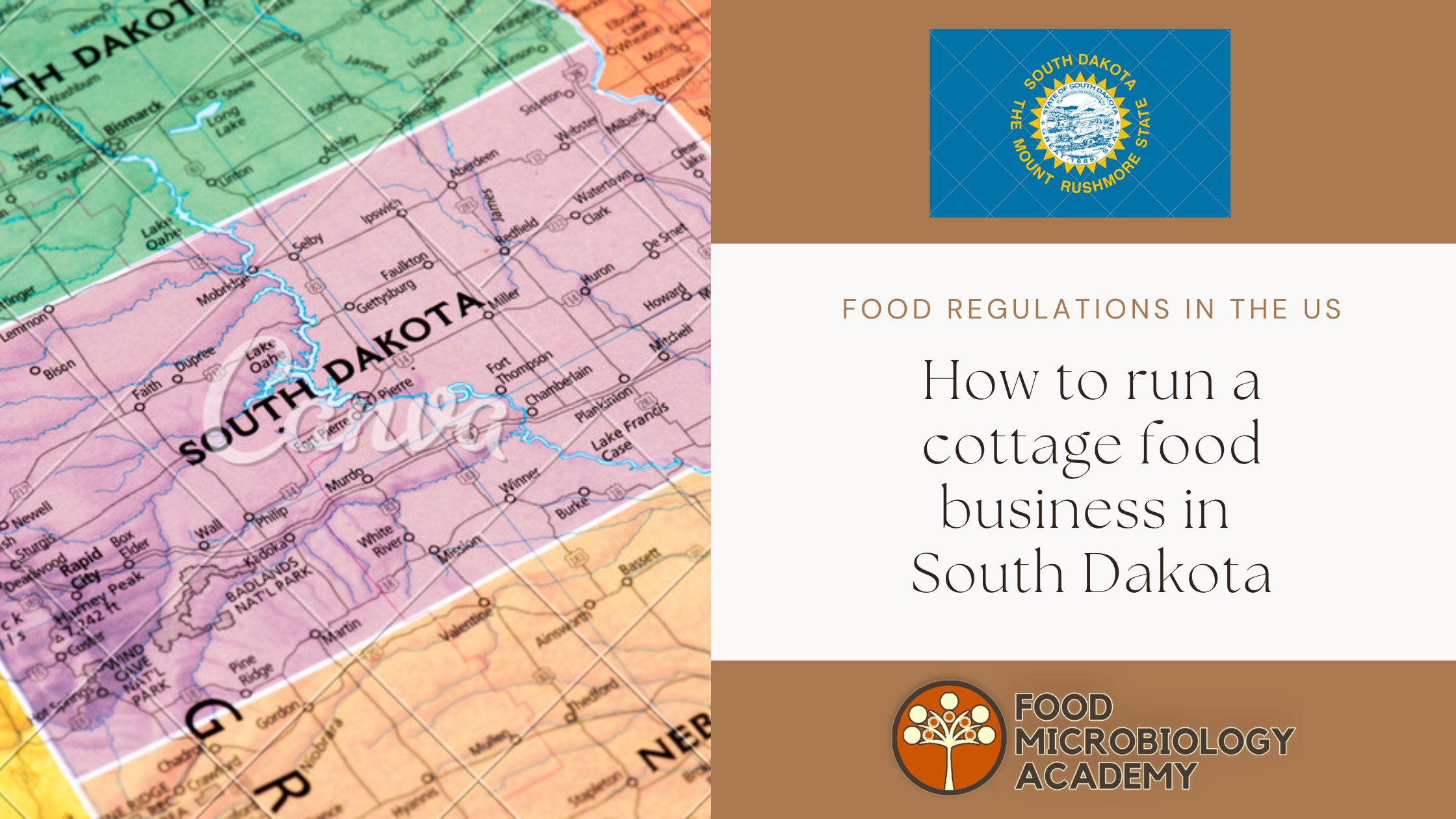Originally published on 25 August 2024 by Gavin Van De Walle
If you choose to undertake the FoodSafePal South Dakota food handler training, you can get a discount off the training fee by using the discount code “foodsafety1” during the registration.
South Dakota cottage food law
South Dakota has among the most liberal cottage food law, thanks to a 2022 reform (1).
This reform decreased the cost of entry to start a cottage food business while greatly expanding the varieties of food that can be sold.
South Dakota cottage food producers must sell directly to consumers in-person at the producer’s primary residence, a farmers’ market, a roadside stand, or another temporary venue.
They may not sell through third-party vendors like restaurants, grocery stores, or coffee shops.
Approved cottage foods
South Dakota cottage food law allows the following foods to be sold:
- fresh, whole, uncut fruits and vegetables like apples, melons, cucumbers, beans, corn ears, tomatoes, potatoes, etc.
- intact salad greens and herbs like mixed greens with leaves, microgreens, and shoots
- baked goods like cookies, rolls, cakes, pies, muffins, breads, hard candies, etc.
- nuts, grains, seeds, and dry mixes like cake mix, cocoa mix, home-ground flour, coffee beans, sunflower seeds, granola mix, intact grains, etc.
Other foods require producers to complete a food safety training course every five years before selling.
These foods include:
- canned goods
- non-heat-produced fermented food stored at 41ºF (5ºC) or below
- soft pies, cheesecake, baked goods having a custard or cream filling, and sauces and pesto stored at 41ºF (5ºC) or below
- home-processed frozen fruit and produce stored at or below 0ºF (-18ºC)
Alternatively, cottage producers can submit their recipes for verification from a third-party processing authority, but this is a more costly and time-consuming option than taking a short, relatively inexpensive food safety training course.
There are no specific requirements for this course other than it must be approved by the South Dakota health department.
A South Dakota food handler training course wouldn’t qualify since they don’t cover food preservation techniques.
Non-approved cottage foods include meats, poultry (including eggs), jerky, seafood, dairy products, honey, and non-food items like homemade soaps or lotions.
Labeling
South Dakota cottage food producers must label their products with the following information:
- product name
- name, address, and phone number of the producer
- date the product was produced
- ingredients
- direction to keep the food refrigerated or frozen, if applicable
The label must also include a disclaimer that states:
“This product was not produced in a commercial kitchen. It has been home-processed in a kitchen that may also possess common food allergens such as tree nuts, peanuts, eggs, soy, wheat, milk, fish, and crustacean shellfish.”
Fresh fruits and vegetables, intact salad greens and herbs, non-packaged baked goods, frozen produce, nuts, grains, seeds, dry mixes, and fermented foods don’t require labeling.
Summary
South Dakota cottage food law allows for the sale of most homemade shelf-stable products. South Dakota requires food safety training to sell other products that require temperature controls.
Ready-to-eat food safety
Most cottage foods are ready-to-eat, meaning they don’t require further preparation or cooking.
As such, it’s important to handle them safely so that you don’t contaminate them with disease-causing organisms called pathogens or other types of food hazards.
Here are some tips to handle ready-to-eat (RTE) foods safely:
- wash your hands often
- use a single-use glove, deli tissue, tong, or spatula to avoid bare-hand contact
- separate RTE foods from raw animal foods
- clean and sanitize your equipment and utensils often
- store refrigerated foods on the top shelf
Summary
Most cottage foods don’t require further preparation or cooking — they are ready to eat. Keep them safe by washing your hands often, avoiding bare-hand contact, and separating them from raw animal foods. You should also clean and sanitize your equipment and utensils often and store those that require refrigeration on the top shelf.
The bottom line
Cottage foods refer to food produced by a person in their home and sold by that same person directly to a consumer.
Cottage food laws exist to regulate what can and cannot be sold but also to make it easier to start a food business and increase access to local food.
South Dakota cottage food law allows for the production and sale of many shelf-stable products, like fresh fruits and vegetables and baked goods.
South Dakota requires food safety training or third-party review of recipes for the production and sale of certain temperature-controlled foods.
Most cottage foods are ready-to-eat so you must handle them safely to reduce the risk of foodborne illness.



